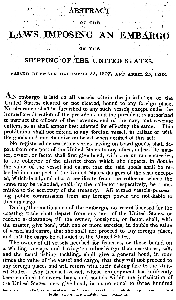 ―97― ―97―
ABSTRACT
of the
LAWS IMPOSING AN EMBARGO
on the
SHIPPING OF THE UNITED STATES.
passed between december 22, 1807, and april 25, 1808.
AN embargo is laid on all vessels within the jurisdiction of the
United States, cleared or not cleared, bound to any foreign place.
No clearance shall be furnished to any such vessel; except under the
immediate direction of the president, and the president is authorized
to instruct the officers of the revenue, and of the navy and revenue
cutters, so as shall appear best adapted for effecting the same. This
prohibition shall not extend to any foreign vessel, in ballast or with
the goods and merchandize on board when notified of this act.
No registered or sea-letter vessel, having on board goods, shall de-
part from one port of the United States to any other, unless the mas-
ter, owner, or factor shall first give bond, with one or more sureties,
to the collector of the district from which she departs, in double
the value of vessel and cargo, that the said goods shall be re-
landed in some port of the United States, dangers of the seas except-
ed, which bond, and also a certificate from the collector where the
same may be relanded, shall, by the collector respectively, be trans-
mitted to the secretary of the treasury. All armed vessels possess-
ing public commissions from any foreign power are not liable to
this embargo.
During the continuance of the embargo, no vessel licensed for the
coasting trade shall depart from any port of the United States, or
receive a clearance, till the owner, consignee, or factor shall, with
the master, give bond, with one or more sureties, in double the value
of vessel and cargo, that she shall not proceed to any foreign place,
and that the cargo be relanded in the United States.
The owner of all vessels licensed for fisheries, or those bound on
a whaling voyage, and having no other cargo than sea-stores, salt,
and the usual fishing tackling, shall give a general bond, in four
times the value of the vessel and cargo, that they will not proceed to
any foreign place, and will return with their fishing fare to the Unit-
ed States. Any licensed vessel, whose employment has uniformly
been confined to rivers, bays, and sounds within the jurisdiction of
the United States, may give bond, in a sum equal to three hundred
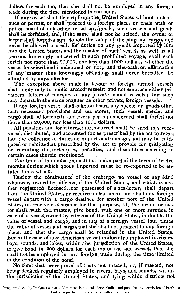 ―98― ―98―
dollars for each ton, that she shall not be employed in any foreign
trade during the time mentioned in the bond.
If any vessel shall depart from the United States without a clear-
ance or permit, or shall proceed to a foreign place, or trade with or
put on board of any other vessel any goods, such vessels and goods
shall be forfeited, and, if the same shall not be seized, the owner or
factor shall forfeit a sum double the value of the ship and cargo, and
never be allowed a credit for duties on any goods imported by him
into the United States, and the master of such vessel, as well as all
persons knowingly concerned in such prohibited voyage, shall each
forfeit not more than 20,000, nor less than 1000 dollars, whether the
vessel be seized and condemned or not; and the oath or affirmation
of any master thus knowingly offending, shall never hereafter be
admitted by any collector.
The exception above made in favour of foreign armed vessels
shall apply only to public armed vessels; and not embrace either pri-
vateers, letters of marque, or any private armed vessels; but such
may depart in the same manner as other private foreign vessels.
If any foreign vessel shall take on board any specie or goods other
than necessary provisions and sea stores, such vessel, specie, and
cargo shall be forfeited; and every person concerned shall forfeit not
more than 20,000, nor less than 1000 dollars.
All penalties and forfeitures thus incurred shall be sued for, reco-
vered, distributed, and accounted for as prescribed by the act to regu-
late the collection of duties on imports and tonnage, and may be miti-
gated or remitted as prescribed by the act to provide for mitigating
or remitting the forfeitures, penalties, and disabilities accruing in
certain cases therein mentioned.
The time of the embargo shall not make part of the term of twelve
months during which goods imported must be re-exported to be en-
titled to drawback.
During the continuance of the embargo, no vessel of any kind
whatever, owned by citizens of the United States, and which is nei-
ther registered, licensed, nor possessed of a sea-letter, shall depart
from the United States, or receive a clearance; nor shall any foreign
vessel depart with a cargo destined for another port of the United
States, or receive a clearance for that purpose, till the owner or fac-
tor shall, with the master, give bond, with one or more sureties, in
case of a vessel owned by citizens of the United States, in double the
value of vessel and cargo, and in that of a foreign vessel four times
the value of vessel and cargo, that she shall not proceed to any foreign
place, and that the cargo shall be relanded in the United States.
But in the case of any American vessel uniformly employed in rivers,
bays, sounds, and lakes, within the jurisdiction of the United States,
to give bond in 200 dollars for each ton of the said vessel, that she
shall not be employed in any foreign trade during the time limited
in the condition of the bond.
No bond shall be required of boats not masted, or, if masted, not
being decked, regularly employed in rivers, bays, and sounds, within
the jurisdiction of the United States, and lying within districts not
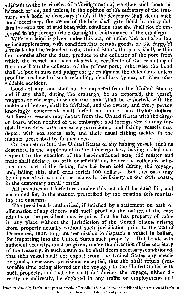 ―99― ―99―
adjacent to the territories of a foreign nation, whether such boats be
licensed or not, and unless, in the opinion of the secretary of the trea-
sury, such bond be necessary; and, if the secretary shall deem such
bond necessary, the owner of the boat shall give bond in thirty dol-
lars for each ton of said boat, with condition that she shall not be em-
ployed in any foreign trade during the continuance of the embargo.
Where a bond is given under this act, or under the embargo law
or its supplements, with condition that certain goods, or the cargo of
a vessel, shall be relanded in the United States, the party shall, within
four months after the date, produce to the collector of the port from
which the vessel had been cleared, a certificate of the relanding of
the same from the collector of the proper port; otherwise the bond
shall be put in suit, and judgment given against the defendant, unless
proof be produced of such relanding, or of loss by sea, or other una-
voidable accident.
Goods of any kind shall not be exported from the United States;
and if any shall, during the embargo, be so exported, the vessel,
waggon, or carriage, in which the same shall be exported, with the
tackle and horses, shall be forfeited, and the owner, and every person
knowingly concerned, shall forfeit not more than 10,000 dollars.
But foreign vessels may depart from the United States with the cargo
on board when notified of the embargo; and foreign vessels may fur-
nish themselves with necessary provisions; and fishing vessels may
depart with sea stores, salt, and their usual fishing tackle, in the
manner prescribed by former acts.
On the return into the United States of any fishing vessel, such as
described in the supplement to the embargo law, having sailed sub-
sequent to the enaction of the last-mentioned acts, the master and
mate shall declare, on oath or affirmation, before the collector, whe-
ther any part of the fishing fare has been sold during the voyage,
and, failing this, shall each forfeit 100 dollars. But this oath may
be dispensed with, so far as relates to the fishery on our own coasts,
in the customary small vessels.
All penalties and forfeitures under this act shall be sued for, and
accounted for, in the manner prescribed by the existing acts regulat-
ing the customs.
The president is authorized, if satisfied by a statement on oath or
affirmation of any citizen, and such proof as the nature of the case
admits, or the president may require, that he has property of value
in any place without the jurisdiction of the United States, arising
from property actually without such jurisdiction prior to the 22d of
December, 1807, to grant permission to dispatch a vessel in ballast,
for importing into the United States such property. But bond, with
sufficient security, must be given, under the direction of the secretary
of the treasury, in such a sum as he shall deem necessary, conditioned,
that such vessel shall not export from the United States any specie
or goods, necessary provisions excepted, that she shall return (rea-
sonable time being allowed for the voyage) to the United States with
such property, and that she shall not during the voyage, either di-
rectly or indirectly, be engaged in any traffic or employment, and
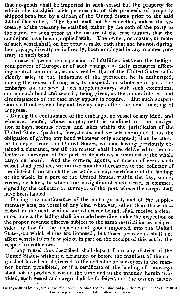 ―100― ―100―
that no goods shall be imported in such vessel but the property for
which she obtained such permission, or the proceeds of property
shipped bona fide by a citizen of the United States prior to the said
22d of December. The bond shall not be cancelled, unless the se-
cretary of the treasury be satisfied, either by the oath of the party to
the same, or such proof as the nature of the case admits, that the
conditions have been complied with. The owner, or master, or mate
of such vessel shall, on her return, make oath that she has not, during
her voyage, directly or indirectly, been employed in any manner con-
trary to such bond.
In case of peace or suspension of hostilities between the bellige-
rent powers of Europe, or of such changes in their measures affect-
ing neutral commerce, as may render that of the United States suffi-
ciently safe, in the judgment of the president, he is authorized,
during the recess of congress, to suspend, in whole or in part, the
embargo and the several acts supplementary, with such exceptions,
and on such bond and security being given, as the public interest and
circumstances of the case may appear to require. But such suspen-
sion shall not extend beyond twenty days after the next meeting of
congress.
During the continuance of the embargo, no vessel of any kind, and
wherever bound, whose employment is confined to the naviga-
tion of bays, sounds, rivers, and lakes within the jurisdiction of the
United States (packets, ferry-boats, and vessels exempted from the
obligation of giving any bond whatever only excepted) shall be allow-
ed to depart from the United States, without having previously ob-
tained a clearance, nor till the master shall have delivered to the col-
lector or surveyor of the port of departure, a manifest of the whole
cargo on board. And the owners, agents, or master of every such
vessel shall produce, within two months thereafter, to the collector of
the district from which the vessel departed, a certificate of the landing
of the whole in a port of the United States, within the bay, sound,
rivers, or lakes, to which the navigation of such vessel is confined,
signed by the collector or surveyor of the port where the cargo shall
have been landed.
During the continuance of the embargo act, and of the supple-
mentary acts, no vessel of any kind whatever, other than those des-
cribed in the next section, and wherever bound, shall receive a clear-
ance, unless the lading shall be made hereafter under the inspection of
the proper revenue officers, subject to the same restrictions as are pro-
vided by law for the inspection of goods imported into the United
States, on which duties are imposed; but these provisions shall not
affect vessels laden in whole or in part on the receipt of this act by the
respective collectors.
If any vessel thus described shall depart from any district of the
United States, without a clearance, or before the manifest of the car-
go shall have been delivered to the collector or surveyor, in the man-
ner herein prohibited, or if a certificate of the landing of the cargo
shall not be produced within the time and in the manner herein pro-
vided, such vessel and cargo shall be forfeited, and the owner, factor,
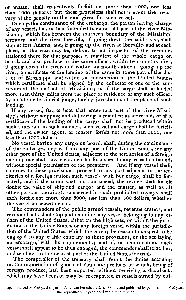 ―101― ―101―
or master shall respectively forfeit not more than 5000, nor less
than 1000 dollars: but these provisions shall not prevent the reco-
very of the penalty on the bond given for such vessel.
During the continuance of the embargo, the person having charge
of any vessel, flat, or boat intended to enter that part of the river Mis-
sisippi, which lies between the southern boundary of the Missisippi
territory and the river Iberville, if going down the said river, shall
stop at fort Adams, and, if going up the river, at Iberville, and at each
place, as the case may be, deliver to an inspector of the revenue,
stationed there for that purpose, a manifest of the whole cargo on
board, and also produce to the same officer, within two months after,
if going down the river, and within six months after if going up the
river, a certificate of the landing of the same in some part of the dis-
trict of Missisippi, and within the jurisdiction of the United States,
which certificate shall be signed by the collector or one of the sur-
veyors of the district of Missisippi; or if the cargo shall be landed
more than thirty miles from the place of residence of any such officer,
by a state or territorial judge, having jurisdiction at the place of such
landing.
If any vessel, flat, or boat shall enter that part of the river Missi-
sippi, without stopping and delivering a manifest as aforesaid, or if a
certificate of the landing of the cargo shall not be produced within
such time, and in such manner, such vessel and cargo shall be forfeit-
ed, and the owner, agent, or master forfeit not more than 5000, nor
less than 1000 dollars.
No vessel having any cargo on board, shall, during the continuance
of the embargo, depart from any port of the United States, for any
other port of the United States, adjacent to the territories of a foreign
nation; nor shall any clearance be furnished to any vessel so bound,
without special permission of the president. And if any vessel shall,
contrary to these provisions, proceed to any port adjacent to the ter-
ritories of a foreign nation, such vessel, with her cargo, shall be for-
feited; and if the same shall not be seized, the owner shall forfeit
double the value of ship and cargo; and the master, as well as all
other persons knowingly concerned in such prohibited voyage, shall
each forfeit not more than 3000, nor less than 500 dollars, whether
the vessel be seized or not.
The commanders of the public armed vessels, revenue cutters, and
revenue boats shall stop and examine any vessel belonging to any ci-
tizen of the United States, either on the high seas, or within the juris-
diction of the United States, or any foreign vessel within the jurisdic-
tion of the United States, which there may be reason to suspect to be
engaged in any traffic contrary to these provisions, or the act laying
an embargo, with its supplements; and if, on examination, such
vessel shall appear to be thus engaged, the commander shall seize her,
and send her to the nearest port of the United States for trial.
The comptroller of the treasury shall remit the duties accruing
on the importation of goods of domestic produce, or which, being of
foreign produce, had been exported without receiving a drawback,
which may have been, or may be re-imported in vessels owned by citi-
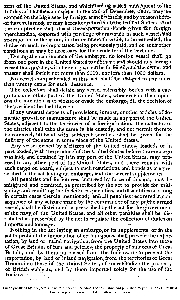 ―102― ―102―
zens of the United States, and which having sailed subsequent to the
1st day of October, and prior to the 22d of December, 1807, may be
stopped on the high seas by foreign armed vessels, and by reason there-
of have returned, or may hereafter return into the United States. And
the comptroller shall direct the exportation bonds given for foreign
merchandize, exported with privilege of drawback in such vessel, and
re-imported in the same, in the manner aforesaid, to be cancelled, the
duties on such re-importation being previously paid, and on such other
conditions as may be necessary for the security of the revenue.
During the continuance of the embargo, no foreign vessel shall go
from one port in the United States to another; and should any foreign
vessel thus go, she, with her cargo, shall be forfeited, and the owner and
master shall forfeit not more than 3000, nor less than 1000 dollars.
No vessel comprehended in this act shall be obliged to pay more
than twenty cents for each clearance.
The collectors shall detain any vessel ostensibly bound with a car-
go to some other port of the United States, whenever in their opini-
ons the intention is to violate or evade the embargo, till the decision of
the president be had thereon.
If any unusual deposits of provisions, lumber, or other articles of do-
mestic growth or manufacture shall be made in any port of the United
States, adjacent to the territories of a foreign nation, the collector of
the district shall take the same in his custody, and not permit them to
be removed, till bond with sufficient sureties shall be given for the
delivery of the same in some place of the United States.
Any vessel owned by a citizen of the United States, loaded, or in
part loaded, with the produce of the United States before the embargo
was laid, and detained by it in any port of the United States, may pro-
ceed to any other port of the United States, and there remain with
such cargo on board, subject to such restrictions and bonds as are pre-
scribed in the act laying an embargo, and the several supplements.
All penalties and forfeitures, incurred by force of this act, may be
mitigated and remitted, as prescribed by the act to provide for miti-
gating and remitting the forfeitures, penalties, and disabilities accruing
in certain cases therein mentioned; and all penalties recovered in con-
sequence of any seizure made by the commander of any public armed
vessel, shall be distributed as prescribed by the act of the government
of the navy of the United States, and all other penalties shall be dis-
tributed as prescribed by the act to regulate the collection of duties on
imports and tonnage.
Nothing in the act laying an embargo, or its supplements, or in the
act to prohibit the importation of certain goods, shall prevent the expor-
tation, by land or inland navigation, from the United States into those
of Great Britain, of furs and peltries, the property of subjects of Great
Britain, and by them purchased from the Indians, or to prevent the
importation, by land or inland navigation, from the territories of Great
Britain into those of the United States, of merchandize the property
of British subjects, and by them imported solely for the use of the
Indians.
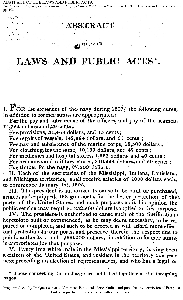 ―103― ―103―
ABSTRACT
of the
LAWS AND PUBLIC ACTS*.
I. FOR the expences of the navy during 1807, the following sums,
in addition to former sums, are appropriated:
For the pay and subsistence of the officers, and pay of the seamen,
74,754 dollars and 29 cents;
For provisions, 31,468 dollars, and 15 cents;
For repairs of vessels, 142,884 dollars, and 61 cents;
For pay and subsistence of the marine corps, 18,500 dollars;
For cloathing for the same, 10,139 dollars, and 42 cents;
For medicines and hospital stores, 1,263 dollars, and 40 cents;
For ordnance and military stores, 310,554 dollars, and 60 cents;
For timber for the navy, 87,500 dollars.
II. Each of the secretaries of the Missisippi, Indiana, Louisiana,
and Michigan territories, shall receive salaries of 1000 dollars each,
to commence January 1st, 1808.
III. The president is authorized to cause to be built or purchased,
armed, and equipped, 188 gun-boats, for the better protection of the
ports of the United States, and such purposes as in his opinion the
public service may require: 852,500 dollars is applied to this purpose.
IV. The president is authorized to cause such of the fortifications
heretofore built or commenced, as he may deem necessary, to be re-
paired or completed, and such to be erected as will afford more effec-
tual protection to our ports, and preserve therein the respect due to
public authority; and 1,000,000 dollars, in addition to former sums,
is approriated for that purpose.
V. Every free white male in the Missisippi territory, having been
a citizen of the United States, and resident in the territory one year
next preceding an election of representatives, and who has a legal or
* Those concerning the embargo are published together in the foregoing pages.
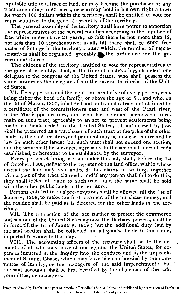 ―104― ―104―
equitable title to a tract of land, or may become the purchaser of any
tract amounting to 50 acres, or who may hold in his own right a town
lot worth 100 dollars within the territory, shall be entitled to vote for
representatives to the general assembly of the territory.
The general assembly of the territory shall have power to apportion
the representatives of the several counties according to the number of
free white males above 21 years; so that there be not more than 12,
nor less than 10 representatives in all, till there shall be 6000 free
males of full age in the territory; after which, the number of repre-
sentatives shall be regulated agreeably [gap] the ordinance for the go-
vernment thereof.
The citizens of the territory, entitled to vote for representatives to
the general assembly, shall, at the time of such voting, also elect one
delegate to the congress of the United States, who shall possess the
same powers as the delegates from the several territories of the Unit-
ed States.
VI. Every person, and the legal representative of every person, who,
being either the head of a family, or above the age of 21, and who, on
the 3d of March, 1807, inhabited and cultivated a tract not claimed by
a certificate of the commissioners east and west of the Pearl river,
in the Missisippi territory, and who has obtained permission to re-
main on such tract, agreeably to an act to prevent settlements being
made on lands ceded to the United States, till authorized by law,
shall be preferred as a purchaser of such tract at the price of the other
lands in the said territory, and payment may be made as is directed by
law for such other lands: but such tract shall not exceed one section,
and the same shall be surveyed agreeably to the sectional lines already
established, or hereafter to be established by the surveyor.
Every person claiming a tract under this act, shall, before the 1st
of October, 1808, deliver to the register of the land office, within whose
district the land may be, a notice of his claim, in writing, together
with a plan of the tract claimed; and if any person shall fail to do this,
they shall forfeit all claim to such tract, and the same shall be sold
with the other public lands in the territory.
Persons entitled to this pre-emption, shall be allowed till the 1st of
January, 1809, to make the first payment of the purchase money, and
the residue shall be paid as is directed for the other lands in the ter-
ritory.
VII. The 1st section of the act further to protect the commerce
and seamen of the United States against the Barbary powers, shall be
in force till the 1st of January, 1809; but the additional duty laid by
the said section shall be collected on all goods, liable to the same,
imported previous to that day.
VIII. The accounting officers of the treasury shall settle the ac-
counts of all who may have claims against the United States, for ex-
pences incurred in the inquiry into the conduct, and in the impeach-
ment of Samuel Chase, which may have been authorized by the com-
mittee of inquiry, or the managers of the said impeachment: but
the said accounts shall be first certified by the chairman of the said
committee, or managers.
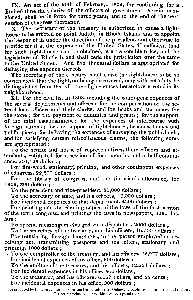 ―105― ―105―
IX. An act of the 20th of February, 1804, for continuing for a
limited time the salaries of the officers of government therein men-
tioned, shall be in force for three years, and to the end of the next
session of congress thereafter.
X. The secretary of the treasury is authorized to cause a light-
house to be erected on point Judith, in Rhode Island, and to appoint
the keeper of it, under the direction of the president, and otherwise to
provide for it at the expence of the United States, if sufficient land
for such light-house can be obtained, at a reasonable price, and the
legislature of Rhode Island shall cede the jurisdiction over the same
to the United States. And five thousand dollars is appropriated for
defraying the expence thereof.
The secretary of the treasury shall cause the light-house to be so
constructed, that the light, on being discovered, may with certainty be
distinguished from that of other light-houses heretofore erected in its
neighbourhood.
XI. For the civil list in 1808, including the contingent expences of
the several departments and offices; for the compensation of the se-
veral loan officers and their clerks, and for books and stationary for
the same; for the payment of annuities and grants; for the support
of the mint establishment; for the expences of intercourse with
foreign nations; for the support of light-houses, beacons, buoys, and
public piers; for defraying the expences of surveying the public lands,
and for satisfying certain miscellaneous claims, the following sums
are appropriated:
To the senate and house of representatives, their officers and at-
tendants, estimated for a session of four months and a half continu-
ance, 201,425 dollars;
For fire-wood, stationary, printing, and other contingent expences
of congress, 29,200 dollars;
For the library of congress, and the librarian's allowance, for
1808, 800 dollars;
To the president and vice-president, 30,000 dollars;
To the secretary of state, and his officers, 13,000 dollars;
For incidental expences of that department, 4200 dollars;
For printing and distributing copies of the laws of the first session
of the tenth congress, and printing the laws in newspapers, 8250 dol-
lars;
To special messengers charged with dispatches, 2000 dollars;
To the secretary of the treasury, and his officers, 16,700 dollars;
For translating foreign languages, to the person employed in re-
ceiving and transmitting passports and sea letters, stationary and
printing, 1000 dollars;
To the comptroller of the treasury, and his officers, 12,977 dollars;
For incidental expences of his office, 800 dollars;
To the auditor of the treasury, and his officers, 12,221 dollars;
For incidental expences in his office, 500 dollars;
To the treasurer, and his officers, 6,227 dollars, and 45 cents;
For incidental expences in his office, 300 dollars;
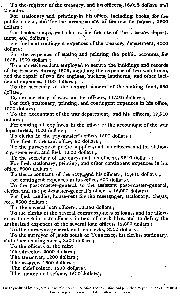 ―106― ―106―
To the register of the treasury, and his officers, 16,052 dollars and
2 cents;
For stationary and printing in his office, including books for the
public stocks, and for the arrangement of the marine papers, 2800
dollars;
For books, maps, and charts, for the use of the treasury depart-
ment, 400 dollars;
For fuel and contingent expences of the treasury department, 4000
dollars;
For the expences of stating and printing the public accounts for
1808, 1200 dollars;
To a superintendant employed to secure the buildings and records
of the treasury during 1808, including the expence of two watchmen,
and the repair of two fire engines, buckets, lantherns, and other inci-
dental expences, 1100 dollars;
To the secretary of the commissioners of the sinking fund, 250
dollars;
To the secretary of war, and his officers, 11,250 dollars;
For fuel, stationary, printing, and contingent expences in his office,
1000 dollars;
To the accountant of the war department, and his officers, 10,910
dollars;
For contingent expences in the office of the accountant of the war
department, 1000 dollars;
To clerks in the pay-master's office, 1800 dollars;
For fuel in the said office, 90 dollars;
To the purveyor of public supplies, and his officers, and for station-
ary, store rent, and fuel, 4,600 dollars;
To the secretary of the navy, and his officers, 9810 dollars;
For fuel, stationary, printing, and other contingent expences in his
office, 2000 dollars;
To the accountant of the navy, and his officers, 10,410 dollars;
For contingent expences in his office, 500 dollars;
To the post-master-general, to the assistant post-master-general,
clerks, and the post-master-general's officers, 16,000 dollars;
For fuel, candles, house-rent for the messenger, stationary, chests,
&c., 2500 dollars;
To the several loan officers, 13,250 dollars;
To the clerks of the several commissioners of loans, and for allow-
ance to certain loan officers in lieu of clerk hire, and to defray the
authorized expences of the several loan offices, 15,000 dollars;
To the surveyor-general, and his clerks, 3200 dollars;
To the surveyor of lands south of Tennessee, his clerks, stationary,
and other contingencies, 3200 dollars;
To the officers of the mint:
The director, 2000 dollars;
The treasurer, 1200 dollars;
The assayer, 1500 dollars;
The chief coiner, 1500 dollars;
The melter and refiner, 1500 dollars;
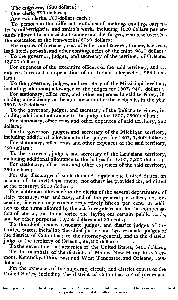 ―107― ―107―
The engraver, 1200 dollars;
One clerk, 700 dollars;
And two clerks, 500 dollars each;
To persons in the different branches of melting, coining, carpen-
ter's, mill-wright's, and smith's work, including 1000 dollars per an-
num, allowed to an assistant coiner and die forger, who also oversees
the execution of the iron-works, 8050 dollars;
For repairs of furnaces, cost of rollers and screws, timber, bar-iron,
lead, steel, pot-ash, and other contingencies of the mint, 2850 dollars;
To the governor, judges, and secretary of the territory of Orleans,
13,000 dollars;
For expences of the executive officers of the said territory, and for
express hire and compensation of an Indian interpreter, 2850 dol-
lars;
To the governor, judges, and secretary of the Missisippi territory,
including additional allowance to the judges for 1807, 9400 dollars;
For stationary, office rent, and other expences in said territory, in-
cluding a deficiency in the appropriation for these objects, in the year
1807, 650 dollars;
To the governor, judges, and secretary of the Indiana territory, in-
cluding additional allowance to the judges for 1807, 7800 dollars;
For stationary, office rent, and other expences of said territory, 350
dollars;
To the governor, judges, and secretary of the Michigan territory,
including additional allowance to the judges for 1807, 7,800 dollars;
For stationary, office rent, and other expences of the said territory,
350 dollars;
To the governor, judges, and secretary of the Louisiana territory,
including additional allowance to the judges for 1807, 7,800 dollars;
For stationary, office rent, and other expences of the said territory,
350 dollars;
For the discharge of such demands against the United States, on
account of the civil department, not otherwise provided for, admitted
at the treasury, 2000 dollars;
For additional allowance to the clerks of the several departments of
state, treasury, war, and navy, and of the general post-office, not ex-
ceeding for each department respectively fifteen per cent. in addi-
tion to the sums allowed by the act to regulate and fix the compensa-
tion of clerks, and to authorize the laying out certain public roads,
and for other purposes, 13,269 dollars and 33 cents;
To the chief justice, associate judges, and district judges of the
United States, including the chief justice and two associate judges of
the district of Columbia; to the attorney-general, and to the district
judge of the territory of Orleans, 59,400 dollars;
To the several district attornies of the United States, 3400 dollars;
To the marshals of the districts of Maine, New Hampshire, Ver-
mont, Kentucky, Ohio, East and West Tennessee, and Orleans, 1600
dollars;
For the expences of the supreme, circuit, and district courts of the
United States, including the district of Columbia, and of jurors and
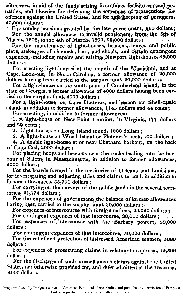 ―108― ―108―
witnesses, in aid of the funds arising from fines, forfeitures, and pe-
nalties, and likewise for defraying the expences of prosecutions for
offences against the United States, and for safe keeping of prisoners,
40,000 dollars;
For sundry pensions granted by the late government, 860 dollars;
For the annual allowance to invalid pensioners, from the 5th of
March, 1808, to the 4th of March, 1809, 98,000 dollars;
For the maintenance of light-houses, beacons, buoys, and public
piers, stakeages of channels, bars, and shoals, and certain contingent
expences, including repairs and raising Newport light-house, 85,000
dollars;
For erecting light-houses at the mouth of the Missisippi, and at
Cape Look-out, in North Carolina, a former allowance of 20,000
dollars having been carried to the surplus fund, 20,000 dollars;
For a light-house on the south point of Cumberland island, in the
state of Georgia, a former allowance of 4000 dollars having been car-
ried to the surplus fund, 4000 dollars;
For a light-house on Cape Hatteras, and beacon on Shell-castle
island, in addition to former allowances, 1145 dollars and 44 cents;
For erecting, in addition to former allowances:
1. A light-house on New Point Comfort, in Virginia, 177 dollars
and 20 cents;
2. Light-houses on Long Island sound, 1000 dollars;
3. A light-house on Wood Island or Fletcher's neck, 100 dollars;
4. A double light-house at or near Chatham harbour, on the back
of Cape Cod, 2000 dollars;
For placing buoys and beacons near the rocks leading into the har-
bour of Salem, in Massachusetts, in addition to former allowances,
5000 dollars;
For the boards formed in the territories of Orleans and Louisiana,
for investigating and adjusting titles and claims to land, in addition to
former allowances, 33,300 dollars;
For carrying on the surveys of the public lands in the several terri-
tories, 21,174 dollars;
For the expences of government, the balance of former allowances
having been carried to the surplus fund, 20,000 dollars;
For expences of intercourse with foreign nations, 33,050 dollars;
For contingent expences of that intercourse, 20,000 dollars;
For expences of intercourse with the Barbary powers, 50,000
dollars;
For contingent expences of that intercourse, 50,000 dollars;
For the relief and protection of distressed American seamen, 5000
dollars;
For expences of prosecuting claims in relation to captures, 12,500
dollars;
For the discharge of such miscellaneous claims against the United
States, not otherwise provided for, and duly admitted at the treasury,
4000 dollars.
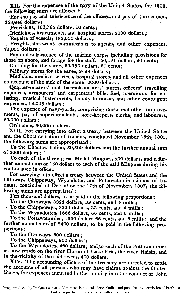 ―109― ―109―
XII. For the expences of the navy of the United States, for 1808,
the following sums are allowed:
For the pay and subsistence of the officers, and pay of the seamen,
368,048 dollars;
Provisions, 162,765 dollars, 10 cents;
Medicines, instruments, and hospital stores, 5000 dollars;
Repairs of vessels, 195,000 dollars;
Freight, store-rent, commissions to agents, and other expences,
75,000 dollars;
Pay and subsistence of the marine corps, including provisions for
those on shore, and forage for the staff, 160,191 dollars, 90 cents;
Clothing for the same, 29,933 dollars, 30 cents;
Military stores for the same, 9654 dollars;
Medicine, medical services, hospital stores, and all other expences
on account of the sick of the same, 2000 dollars;
Quarter-masters' and barrack-masters' stores, officers' travelling
expences, armourers' and carpenters' bills, fuel, premiums for en-
listing, musical instruments, bounty to music, and other contingent
expences, 14,035 dollars;
The expence of navy-yards, comprizing docks and other improve-
ments, pay of superintendants, store-keepers, clerks, and labourers,
60,000 dollars;
Ordnance, 50,000 dollars.
XIII. For carrying into effect a treaty between the United States
and the Choctaw nation of Indians, concluded November 16th, 1805,
the following sums are appropriated:
To the Choctaw nation, 50,500 dollars, and the further annual sum
of 3000 dollars;
To each of the three great Medal Mingoes, 500 dollars, and a fur-
ther annual sum of 150 dollars to each of the said Mingoes during his
continuance in office;
For carrying into effect a treaty between the United States and the
Ottoway, Chippeway, Wyandotte, and Pottawatamie nations of In-
dians, concluded at Detroit on the 17th of November, 1807, the fol-
lowing sums are appropriated:
Ten thousand dollars, to be paid in the following proportions:
To the Ottoways, 3333 dollars, 33 cents, and 4 mills;
To the Chippeways, 3333 dollars, 33 cents, and 4 mills;
To the Wyandottes, 1666 dollars, 66 cents, and 6 mills;
To the Pottawatamies, 1666 dollars 66 cents, and 6 mills: and the
further annual sum of 2400 dollars, to be paid in the following pro-
portions:
To the Ottoways, 800 dollars;
To the Chippeways, 800 dollars;
To the Wyandottes, 400 dollars; and to such of the Pottawatamies
as now reside on the river Huron of Lake Erie, the river Raisin, and
in the vicinity of the said rivers, 400 dollars.
XIV. The accounting officers of the treasury are directed to settle
the accounts of all persons who may have claims against the United
States, for expences incurred in the inquiry into the conduct of John
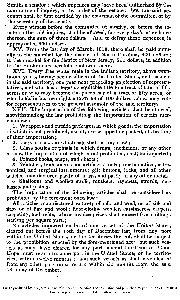 ―110― ―110―
Smith, a senator; which expences may have been authorized by the
committee of inquiry, or by order of the senate: but the said ac-
counts shall be first certified by the chairman of the committee, or by
the secretary of the senate.
Every witness before the committee of inquiry, or before the se-
nate on the said inquiry, shall be allowed, for every day's attendance
thereon, the sum of three dollars. And to defray these expences, is
appropriated 500 dollars.
XV. From the last day of March, 1808, there shall be paid annu-
ally to the marshal for the district of North Carolina, 400 dollars;
to the marshal for the district of New Jersey, 200 dollars, in addition
to the emoluments heretofore allowed them.
XVI. Every free white male in the Indiana territory, above twen-
ty-one years, having been a citizen of the United States, and resident
in the said territory, one year next preceding an election of represen-
tatives, and who has a legal or equitable title to a tract of land of fifty
acres, or who may become the purchaser of a tract of fifty acres, or
who holds in his own right a town lot of 100 dollars value, may vote
for representatives to the general assembly of the said territory.
XVII. The importation of the following articles shall be allowed,
notwithstanding the law prohibiting the importation of certain mer-
chandize:
1. Wrappers and outside packages, in which goods, the importation
of which is not prohibited, usually are wrapped or packed, at the time
of their importation;
2. Bags or sacks in which salt shall be imported;
3. Glass bottles or phials in which drugs, medicines, or any other
article, the importation of which is not prohibited, shall be imported;
4. Printed books, maps, and charts;
5. Watches, tradesmen's and artificers' tools; mathematical, astro-
nomical, and surgical instruments; gilt buttons, locks, and all other
articles manufactured partly of brass, and partly of any other metal.
6. Shalloons and woollen stuffs, muskets, bayonets, swords, cut-
lasses, and pistols.
The importation of the following articles shall be considered as
prohibited by the fore-mentioned law:
All articles manufactured entirely of silk and wool, or of silk and
flax, or of flax and wool; floor-cloths, woollen cassimeres, carpets,
carpeting, and mats, whose invoice prices shall exceed five shillings
sterling per square yard;
No articles imported on board any vessel of the United States,
cleared out before the 14th day of December last, from any port
within the United States, or the territories thereof, shall be subject
to the prohibition enacted by the fore-mentioned act: but such ves-
sels as may have cleared for any port beyond the Cape of Good
Hope must return to some port in the United States, or its territo-
ries, within twelve months; and such vessels as shall have cleared
from any other port must return within six months from the said
14th day of December.
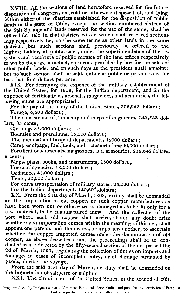 ―111― ―111―
XVIII. All the sections of land heretofore reserved for the future
disposition of congress, not sold or otherwise disposed of, and lying
within either of the districts established for the disposition of public
lands in the state of Ohio, except the section numbered sixteen of
the Salt Springs and lands reserved for the use of the same, shall be
offered for sale in that district, within which such reserved sections
may respectively lie, on the same terms as other lands in the same
district: but such sections shall previously be offered to the
highest bidder, at public sales, under the superintendence of the re-
gisters and receivers of public monies of the land offices respectively
to which they are attached, on terms provided by law for the sales of
other public lands, and on such days as the president shall appoint:
but no such section shall be sold, either at public or private sale, for
less than four dollars per acre.
XIX. For defraying the expence of the military establishment of
the United States, for 1808, for the Indian department, and for the
expence of fortifications, arsenals, magazines, and armouries, the fol-
lowing sums are appropriated:
For the pay of the army of the United States, 302,952 dollars;
Forage, 4,608 dollars;
The subsistence of the army and corps of engineers, 242,548 dol-
lars, 35 cents;
Clothing, 85,000 dollars;
Bounties and premiums, 15,000 dollars;
The medical and hospital departments, 15000 dollars;
Camp equipage, fuel, tools, and transportation, 90,000 dollars;
Fortifications, arsenals, magazines, and armouries, 218,642 dollars,
5 cents;
Maps, plans, books, and instruments, 1500 dollars;
For contingencies, 18,000 dollars;
Ordnance, 45,000 dollars;
Tents, 20,000 dollars;
For extra transportation of military stores, 25,000 dollars;
For the Indian department, 140,600 dollars;
XX. From the 31st day of March, 1808, no duty shall be demanded
on the importation of old copper, or such copper manufactures as
have been worn out or otherwise so damaged as to be fit only for a
raw material, to be manufactured anew. And the collector of the
port where such old copper shall arrive, should any doubt arise
whether such importation comes within the meaning of this act, shall
appoint one person, and the owner, or importer, another, to ascertain
whether the copper imported comes under the denomination of old
copper, as above described; and the proceedings shall be so con-
ducted as are directed by the fifty-second section of the act passed the
2d of March, 1799, regulating the collection of duties on imports and
tonnage, in cases of incomplete entry, or of damage sustained by
goods, during the voyage.
From the said 31st day of March, no duty shall be demanded on
the importation of saltpetre or sulphur.
XXI. The circuit court of the United States, in the second circuit,
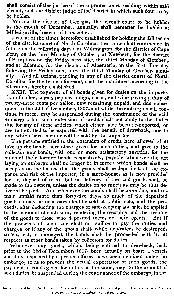 ―112― ―112―
shall consist of the justice of the supreme court residing within said
circuit, and the district judge of the district in which such court may
be holden.
Within the district of Georgia, the circuit court to be holden
in the month of December, annually, shall hereafter be holden at
Milledgeville, instead of Louisville.
Instead of the times heretofore established for holding the fall terms
of the district court of North Carolina, the same shall commence in
future on the following days: at Wilmington, for the district of Cape
Fear, on the third Monday of October; at Newbern, for the district
of Pamptico, on the Friday next after the third Monday of October;
and at Edenton, for the district of Albemarle, on the first Tuesday
following the Friday next after the third Monday of October, annu-
ally. And all actions, pending in any of the district courts of North
Carolina, for the terms aforesaid, shall be continued according to the
alterations hereby established.
XXII. The payment of all bonds given for duties on the importa-
tion of coffee, sugar, pepper, indigo, cocoa, and wine paying a duty of
twenty-three cents per gallon, now remaining unpaid, and due subse-
quent to the 22d of December, 1807, and while the embargo shall con-
tinue in force, may be suspended during the continuance of the said
embargo: but such extension of credit shall not apply to the duties
due for any of these articles, which either have been re-exported, or
are not entitled to be exported with the benefit of drawback, nor to
any which have been or will be sold by the importer.
The persons entitled to the extension of credit here allowed shall
take up the bonds heretofore given for such duties, and give to the
collector new bonds, with one or more satisfactory sureties, for the
sums of their former bonds respectively, payable whenever the act
laying an embargo shall no longer be in force: which bonds shall be
accepted on the terms, that the goods shall be deposited, at the ex-
pence and risk of the importer, in a store-house, as is now provided
for the deposit of teas; but no delivery of the said goods shall be
made to the owners, unless the duties on so much as may be thus de-
livered be paid. And whenever the bonds shall become due, and re-
main unpaid more than forty-five days, so much of the deposited
goods as may be necessary shall be sold at public sale, and the pro-
ceeds, after deducting the charges of safe-keeping and sale, be applied
to the payment of such sum, rendering the overplus and the residue
of the goods to those who deposited them, or their agents. But if
the proceeds of such sale shall not suffice to pay the duties and
charges, or if any of the goods shall, while deposited, be destroyed,
stolen, lost, or damaged, the bonds shall be proceeded with in all
respects as other bonds taken by collectors for duties.
Whenever any goods, which, being entitled to drawback, had,
prior to the 22d of December, 1807, been actually on board a vessel,
and duly inspected by a proper officer, have been detained under the
embargo, so as to prevent the actual exportation of such goods, the
payment of bonds given for duties on the same, may, to the amount of
such duties, be suspended during the continuance of the embargo, in the
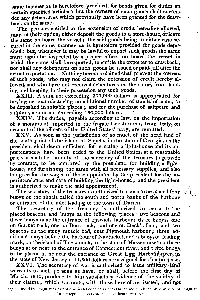 ―113― ―113―
same manner as is heretofore provided for bonds given for duties on
certain specified articles: but the owners of such goods shall surren-
der any debentures which previously have been granted for the draw-
back on the same.
The persons entitled to the extension of credit hereafter allowed,
may, at their option, either deposit the goods in a store-house, or leave
the same on board the vessel; the said goods being in either case se-
cured in the same manner as is heretofore provided for goods depo-
sited: but, whenever it may be lawful to export such goods, the same
must again be inspected by a proper officer on board the vessel in
which the same shall be exported, to entitle the exporter to drawback;
nor shall any debentures on such goods be issued or paid, till after the
actual exportation. Nothing herein ordained shall prevent the owners
of such goods, who may not claim the extension of credit hereby al-
lowed, and who have not received debentures on the same, from land-
ing and keeping in their possession any such goods.
XXIII. A sum not exceeding 300,000 dollars is appropriated for
buying or manufacturing an additional number of stands of arms, to
be deposited in suitable places; and for the purchase of saltpetre and
sulphur, a sum not exceeding 150,000 dollars.
XXIV. The duties, payable according to law, on the importation
of a monument imported in the frigate Constitution, from Italy, on
account of the officers of the United States' navy, are remitted.
XXV. As soon as the jurisdiction of so much of the head land of
the south point of the island of Sapelo, in the state of Georgia, as the
president shall deem sufficient for erecting a light-house and its ap-
purtenances, have been ceded to the United States, at a reasonable
price, it shall be the duty of the secretary of the treasury to provide
by contract, to be approved by the president, for building a light-
house, and furnishing the same with all necessary supplies, and also
to agree for the wages of those appointed by the president for the su-
perintendance and care of building the light-house; and the president
is authorized to make the said appointment.
The secretary of the treasury is authorized to cause to be placed four
buoys on the shoals called the south and north banks of the harbour
or entrance of the inlet leading to the town of Darien.
The secretary of the treasury is authorized to cause to be
placed beacons and buoys at the following places: two beacons and
three buoys near the entrance of Ipswich harbour; three buoys, one
on Gurnet rock, one on Boss rock, and one on Deck's flats, and two
beacons on the stony muscle bed, near Plymouth harbour; three ad-
ditional buoys before the harbour of Nantucket, and a buoy, or leading
mark, on the island of Tuckanuck, in the state of Massachusetts; three
buoys at or near to the entrance of Connecticut river, and three buoys
to be placed at or near the entrance of Great Egg Harbour river, in
the state of New Jersey: 11,500 dollars are assigned for this purpose.
XXVI. The secretary of war is authorized to issue military land
warrants to such persons as have, or shall, before the first day of
March, 1810, produce to him satisfactory evidence of the validity of
their claims; which warrants, with those heretofore issued, and not
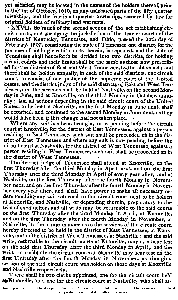 ―114― ―114―
yet satisfied, may be located in the names of the holders thereof, prior
to the 1st of October, 1810, on any unlocated parts of the fifty quarter
townships, and the fractional quarter townships, reserved by law for
original holders of military land warrants.
XXVII. So much of the second section of the act establishing cir-
cuit courts, and abridging the jurisdiction of the district courts of the
districts of Kentucky, Tennessee, and Ohio, passed the 24th day of
February, 1807, constituting the state of Tennessee one district, for the
purpose of holding circuit courts therein, is repealed, and the state of
Tennessee shall henceforth be divided into two districts, for holding
circuit courts, and their limits shall be the same as those now prescrib-
ed for the districts of East and West Tennessee, by the above act; and
there shall be holden annually, in each of the said districts, one circuit
court, to consist of one justice of the supreme court of the United
States, and the district judge of the said districts of East and West Ten-
nessee, and the sessions shall be held at Nashville, on the second Mon-
day in June, and at Knoxville, on the third Monday in October, annu-
ally; and all actions depending in the said circuit court of the United
States, to be held at Nashville, on the first Monday in June next, shall
be returned, and continued to the second Monday in June next, as they
would have been if this change had not taken place.
Where any suit has been brought, or is pending before the circuit
court at Knoxville, for the district of East Tennessee, against a person
residing in East Tennessee, such suit shall be proceeded on in the dis-
trict of East Tennessee and where any suit is now pending before the
circuit court at Nashville, for the district of West Tennessee, against a
person residing in West Tennessee, such suit shall be proceeded on in
the district of West Tennessee.
The district judge of Tennessee shall attend at Knoxville, on the
first Thursday after the third Monday in April next, and on the first
Thursday after the third Monday in April of every year after, and at
Nashville, on the first Thursday after the fourth Monday in Novem-
ber next, and on the first Thursday after the fourth Monday in Novem-
ber every year after, and shall have power to make all necessary or-
ders touching any suit returned to the circuit court next to be holden
at Knoxville, and Nashville, or depending therein, preparatory to the
trial of such action, and all writs may be returnable to the said courts
on the first Thursday after the third Monday in April, at Knoxville,
and on the first Thursday after the fourth Monday in November, at
Nashville, in the same manner as to the sessions of the circuit court,
hereby directed to be held in the district of East Tennessee, at Knox-
ville, and in the district of West Tennessee, at Nashville; and the said
writs, returnable to the circuit courts at Knoxville, may also bear test
on the said first Thursday after the third Monday in April; and the
writs returnable to the circuit courts at Nashville may bear test on the
first Thursday after the fourth Monday in November, as though a
session of the said circuit court was holden on those days at Knoxville
and Nashville respectively.
There shall be two clerks appointed, one for the circuit court held
at Knoxville, and one for the circuit court at Nashville, who shall at-
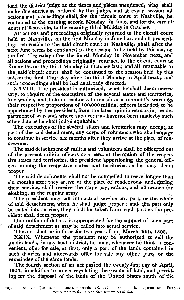 ―115― ―115―
tend the district judge at the times and places mentioned, who shall
make due entries as ordered by the judge, and at every session all
actions and proceedings shall, for the circuit court at Nashville, be
continued to the ensuing second Monday in June, and for the circuit
court at Knoxville, to the ensuing third Monday in October.
All actions and proceedings originally returned to the circuit court
held at Nashville, on the first Monday in June last, and all proceed-
ings returnable to the said circuit court at Nashville, shall, after the
next June term, be continued in the session to be held by this act, on
the first Thursday after the fourth Monday in November next, and
all actions and proceedings originally returned to the circuit court at
Knoxville, on the third Monday in October last; and all returnable to
the said circuit court shall be continued to the session held by this
act, on the first Thursday after the third Monday in April next; and
such proceedings shall be had as already directed.
XXVIII. The president is authorized, when he shall deem neces-
sary, to require of the executives of the several states and territories,
to organize, and hold in readiness to march at a moment's warning,
their respective proportions of 100,000 militia, officers included, to be
apportioned by the president, from the latest militia returns in the de-
partment of war, and, where such returns have not been made, by such
other data as he shall judge equitable.
The executives of the several states and territories may accept, as
part of the said detachment, any corps of volunteers who shall engage
to continue in service six months after they arrive at the place of ren-
dezvous.
The said detachment of militia and volunteers shall be officered out
of the present militia officers or others, at the option of the respec-
tive states and territories, the president apportioning the general offi-
cers among the respective states and territories as he may deem
proper.
The said detachments shall not be compelled to serve longer than
six months after they arrive at the place of rendezvous, and, during
their service, shall receive the same pay, rations, and allowance for
clothing, as the regular army.
The president may call into actual service any part, or the whole
of said detachment, when he shall judge proper; and, if a part only
be called into service, they shall be taken from such part as the pre-
sident shall deem proper.
One million of dollars is appropriated for the support of such part
of said detachment as may be called into actual service.
This act shall be in force for two years from March 30th, 1808.
XXIX. Whenever the president may be authorized to sell the
public lands, in any land district, he may, whenever he think it con-
venient, offer for sale, at first, only a part of the lands contained in
such district, and afterwards offer for sale any other part, or the
remainder of the same lands.
The fourth section of an act passed the twenty-first day of April,
1806, in addition to an act regulating the grants of land, and provid-
ing for the disposal of the lands of the United States south of the
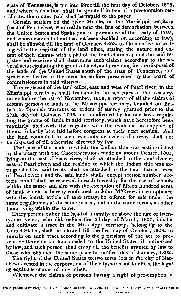 ―116― ―116―
state of Tennessee, is put into force till the first day of October, 1808,
and, where a donation shall be granted in lieu of a pre-emption cer-
tificate, the money paid shall be repaid to the payer.
Certain settlers on the river Mobile, in the Missisippi territory
(east of Pearl river, who reside near the line of demarkation, between
the United States and Spain, run in pursuance of the treaty of 1795,
and whose claims to land has not been decided on according to law),
shall be allowed till the first of October, 1808, to file a notice in writ-
ing with the register of the land office, stating the nature and ex-
tent of their claims, with a plat of the tract claimed; and the said re-
gister and receiver shall determine such claims according to the se-
veral acts regulating the grants of land, and providing for the disposal of
the lands of the United States south of the state of Tennessee, and
grant certificates in the form heretofore prescribed by the board of
commissioners in said district.
The registers of the land office, east and west of Pearl river, in the
Missisippi territory, shall transmit to the secretary of the treasury,
on or before the 1st of November, 1808, a report of all the claims of
certain persons to lands in the Missisippi territory, founded on Bri-
tish or Spanish warrants or orders of survey granted prior to the
27th day of October, 1795, not confirmed by former laws regula-
ting the grants of lands in said territory, which have heretofore been
regularly filed with the register with the evidence in support of
them, to be by him laid before congress at their next session. And
the land contained in such warrants or orders of survey shall not
be disposed of till otherwise directed by law.
That part of the lands to which the Indian title was extinguished
by the treaty with the Choctaw nation, made on mount Dexter, 1805,
lying on the east of Pearl river, shall be attached to the land district
east of Pearl river, and the residue to which the Indian title was ex-
tinguished by said treaty shall be attached to the land district west
of Pearl river; and the said lands shall, except section number six-
teen, which shall be reserved in each township for the use of schools
within the same, and also with the exception of fifteen hundred acres
of land, which is hereby confirmed to John M'Grew, in compliance
with the fourth article of said treaty, be offered for sale under the
same regulations, at the same prices, and on the same terms, as other
lands lying within the same.
Every person, either the head of a family, or above the age of twen-
ty-one years, who did, before the 3d day of March, 1807, inhabit
and cultivate a tract in the Missisippi territory, belonging to the
United States, shall be allowed till the first day of October, 1808, to
remain on such tract according to the provisions of the act to pre-
vent settlements on lands ceded to the United States till authorized
by law, and such person shall enjoy all the benefits granted by law to
those who obtained the same prior to the first day of January, 1808.
The right of the United States to two town lots in the city of Nat-
chez is vested in the corporation of the city, so as not to affect the legal
or equitable claims of any other.
Whenever the claims of persons having a right of pre-emption in
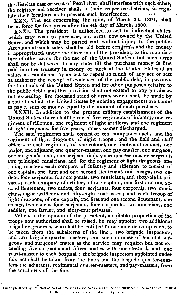 ―117― ―117―
the districts east or west of Pearl river shall interfere with each other,
the register and receiver shall, in their respective districts, so regu-
late their locations as to prevent such interference.
XXX. The act concerning the mint, of March 3d, 1801, shall
be in force for five years after the 4th day of March, 1808.
XXXI. The president is authorized to sell to individual states,
which may wish to purchase, any arms now owned by the United
States, and which may be parted with without injury to the public.
Accounts of such sales shall be laid before congress, and the money
is appropriated, under the direction of the president, to the manufac-
ture of other arms for the use of the United States: but such arms
shall not be delivered to any state till the purchase money is first
paid into the treasury in money, or stock of the United States at its
value, as established by an act to repeal so much of any act or acts
as authorize the receipt of evidences of the public debt, in payment
for the lands of the United States, and for other purposes relative to
the public debt: and this provision shall not extend to any purchase,
not exceeding five thousand stand of arms, which shall be made by
a state to which the United States by existing engagements are bound
to pay a sum of money, equal to the amount of such purchase.
XXXII. In addition to the present military establishment of the
United States, there shall be raised five regiments of infantry, one re-
giment of riflemen, one regiment of light artillery, and one regiment
of light dragoons, for five years, unless sooner discharged.
The said regiments shall consist of ten companies each, and the
regiment of light dragoons of eight troops; and the field and staff
officers of each regiment, of one colonel, one lieutenant-colonel, one
major, one adjutant, one quarter-master, one pay-master, one surgeon,
one surgeon's mate, one serjeant major, one quarter-master sergeant,
two principal musicians, and for the regiment of light dragoons, one
riding master; each company of infantry and riflemen to consist of
one captain, one first and one second lieutenant, one ensign, two ca-
dets, four serjeants, four corporals, two musicians, and sixty-eight pri-
vates; each company of artillery of one captain, one first and one se-
cond lieutenant, two cadets, four serjeants, four corporals, two musi-
cians, eight artificers, and fifty-eight matrosses; and each trooop of
light dragoons, of one captain, one first and one second lieutenant, one
cornet, two cadets, four serjeants, four corporals, two musicians, one
saddler, one farrier, and sixty-four privates.
When, in the opinion of the president, a suitable proportion of the
troops now authorized shall be raised, he may appoint two additional
brigadier-generals, who shall be entitled to one aide-de-camp each, to
be taken from the subalterns of the line; two brigade inspectors,
and two brigade quarter-masters; and such number of hospital sur-
geons and surgeons' mates as the service may require, but not ex-
ceeding five surgeons and fifteen mates, with one steward, and one
ward-master to each hospital; the brigade inspectors appointed under
this act shall be taken from the line; and the brigade quarter-mas-
ters, the adjutants, regimental quarter-masters, and pay-masters, from
the subalterns of the line.
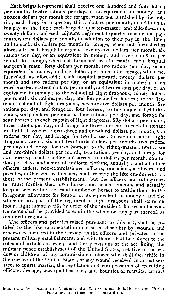 ―118― ―118―
Each brigadier-general shall receive one hundred and four dollars
per month, twelve rations per day, or an equivalent in money, and
sixteen dollars per month for forage, when not furnished by the pub-
lic; each brigade inspector, thirty dollars per month, in addition to
his pay in the line; each brigade quarter-master and aide-de-camp,
twenty dollars, and each adjutant regimental quarter-master and pay-
master, ten dollars per month, in addition to their pay in the line;
and to each, six dollars per month for forage, when not furnished as
aforesaid: each hospital surgeon, seventy-five dollars per month, six
rations per day, or an equivalent in money, and twelve dollars per
month for forage, when not furnished as aforesaid; each hospital
surgeon's mate, forty dollars per month, two rations per day, or an
equivalent in money, and six dollars per month for forage, when not
furnished as aforesaid; each hospital steward, twenty dollars per
month and two rations per day, or an equivalent in money; each
ward-master, sixteen dollars per month, and two rations per day, or an
equivalent in money; to the colonel of light dragoons, ninety dollars
per month, six rations per day, and forage for five horses; to the lieu-
tenant-colonel of light dragoons, seventy-five dollars per month, five
rations per day, and forage for four horses; to the major of light dra-
goons, sixty dollars per month, four rations per day, and forage for
four horses; to each captain of light dragoons, fifty dollars per month,
three rations per day, and forage for three horses; to each lieutenant
of light dragoons, thirty-three and one-third dollars per month, two
rations per day, and forage for two horses; to each cornet of light
dragoons, twenty-six and two-thirds dollars per month, two rations
per day, and forage for two horses; to the riding-master, twenty-six
and two-thirds dollars per month, two rations per day, and forage for
two horses; each saddler and farrier, ten dollars per month, one ra-
tion per day, and a suit of uniform clothing annually; and all other
officers, cadets, non-commissioned officers, musicians, artificers, and
privates, authorized by this act, shall receive the like emoluments as
those of the present establishment: but the officers and riding mas-
ter must furnish their own horses and accoutrements, and actually
keep in service the aforesaid number of horses to entitle them to the
foregoing allowance for forage, or its equivalent in money: and the
whole or any part of the regiment of light dragoons shall serve on
foot as light infantry, till, by order of the president, horses and accou-
trements shall be provided to equip the whole or any part thereof, as
mounted dragoons.
The officers and privates raised pursuant to this act, shall be en-
titled to the like compensation in case of disability by wounds and
otherwise, incurred in the service, as the officers and privates in the
present military establishment, and with them shall be subject to the
rules and articles of war; and the provisions of the act, fixing the
military peace establishment of the United States, relative to the wi-
dow or children of any commissioned officer who shall die, while in
the service of the United States, of any wound received in actual ser-
vice, to courts martial, the regulation and compensation of recruiting
officers, the age, size, qualifications, and bounties of recruits, arrears
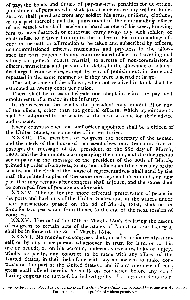 ―119― ―119―
of pay, the bonds and duties of pay-masters, penalties for desertion,
punishment of persons who shall procure or entice any soldier to de-
sert, or shall purchase from any soldier his arms, uniform, clothing,
or any part thereof; and the punishment of the commanding officer
of any vessel, who shall receive on board as one of his crew, knowing
him to have deserted, or otherwise carry away, any such soldier, or
shall refuse to deliver him up to the orders of his commanding offi-
cer; to the oath or affirmation to be taken and subscribed by officers,
non-commissioned officers, musicians, and privates, to the allow-
ance for extra expence to any commissioned officer in travelling and
sitting on general courts martial, to arrests of non-commissioned
officers, musicians, and privates for debts, to the allowance to soldiers
discharged from service, except by way of punishment, in force and
repeated in the same manner as if they were inserted at large.
The subsistence of the officers, when not received in kind, shall be
estimated at twenty cents per ration.
There shall be to each brigade one chaplain, with the pay and
emoluments of a major in the infantry.
In the recess of the senate, the president may appoint all or any
of the officers, other than the general officers, which appointments
shall be submitted to the senate, at the next session, for their advice
and consent.
Every commissioned and staff officer appointed shall be a citizen of
the United States, or some one of its territories.
XXXIII. The members of congress, the secretary of the senate,
and the clerk of the house of representatives may transmit, free of
postage, the message of the president, of the 22d day of March,
1808, and the documents accompanying the same, and the documents
accompanying the message of the president of the 30th of March,
printed by order of congress, to any post-office; and the secretary of the
senate, and the clerk of the house of representatives, shall send by the
mail the printed copies of the same message and documents, or any
part that may remain after congress shall adjourn, and the same shall
be conveyed free of postage as aforesaid.
XXXIV. The act for the more effectual preservation of peace in
the ports and harbours of the United States, and in the waters under
their jurisdiction, passed on the 3d of March, 1805, shall be in
force for two years, and from thence to the end of the next session of
congress.
XXXV. The act of the 17th of March, 1800, declaring the assent
of congress to certain acts of the states of Maryland and Georgia,
shall be in force till the 3d of March, 1814.
XXXVI. No member of congress shall, directly or indirectly, him-
self, or by any other person whatsoever in trust for him, or for his
use or benefit, or on his account, undertake, execute, hold, or enjoy,
wholly or partly, any contract to be made with any officer of the
United States, in their behalf, or with any authorized to make con-
tracts on the part of the United States; and if any member of con-
gress shall offend herein, he shall, on conviction before any court
having cognizance thereof, be judged guilty of a high misdeameanor,
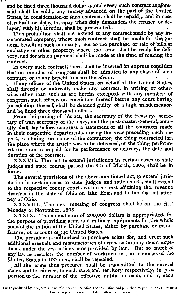 ―120― ―120―
and be fined three thousand dollars; and every such contract as afore-
said shall be void; any money advanced on the part of the United
States, in consideration of such contract, shall be repaid; and in case
of refusal or delay to repay when duly demanded, the refuser or de-
layer, with his sureties, shall be prosecuted.
This prohibition shall not extend to any contract made by any in-
corporated company, where such contract shall be made for the ge-
neral benefit of such company; nor to the purchase or sale of bills of
exchange or other property, where the same shall be ready for deli-
very, and for which payment shall be made at the time of making the
contract.
In every such contract, there shall be inserted an express condition
that no member of congress shall be admitted to any share of such
contract, or to any benefit to arise therefrom.
If any officer of the United States, on behalf of the United States,
shall directly or indirectly make any contract, in writing or other-
wise, other than such as are herein excepted, with any member of
congress, such officer, on conviction thereof before any court having
jurisdiction thereof, shall be deemed guilty of a high misdemeanor,
and be fined three thousand dollars.
From the passing of this act, the secretary of the treasury, secre-
tary of war, secretary of the navy, and the post-master-general, annu-
ally shall lay before congress a statement of all the contracts made
in their respective departments, during the year preceding such re-
port, exhibiting the name of the contractor, the thing contracted for,
the place where the article was to be delivered, or the thing perform-
ed, the sum to be paid for its performance or delivery, the date and
duration of the contract.
XXXVII. The act to extend jurisdiction in certain cases to state
judges and state courts, passed the 8th of March, 1806, shall be in
force.
The several provisions of the above-mentioned act, to extend juris-
diction in certain cases to state judges and state courts, shall extend
to the respective county courts within or next adjoining the revenue
districts in the state of Ohio on lake Erie, and to the district attor-
ney of Ohio.
XXXVIII. The next meeting of congress shall be on the first
Monday of November, 1808.
XXXIX. The annual sum of 200,000 dollars is appropriated, for
the purpose of providing arms and military equipments for the whole
body of the militia of the United States, either by purchase or manu-
facture, on account of the United States.
The president is authorized to purchase scites for, and erect such
additional arsenals and manufactories of arms, as he may deem expe-
dient, under the restrictions now provided by law. But so much of
any law as restricts the number of workmen in the armories of the
United States to 100 men, shall be repealed.
All the arms thus procured shall be transmitted to the several
states and territories, to each state and territory respectively, in pro-
portion to the number of the effective militia in each, and by each
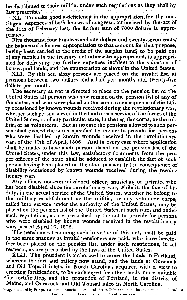 ―121― ―121―
be distributed to their militia, under such regulations as they shall by
law prescribe.
XL. To make good a deficiency in the appropriation for the con-
tingent expences of both houses of congress, authorized by the act of
the 10th of February last, the further sum of 7000 dollars is appro-
priated.
Five thousand four hundred and one dollars and twenty-seven cents,
the balance of a former appropriation to that amount for that purpose,
having been carried to the credit of the surplus fund, to be paid out
of any monies in the treasury not otherwise appropriated, is appropri-
ated for defraying the further expences incident to the valuation of
houses and lands, and the enumeration of slaves in the United States.
XLI. By this act, sixty persons are placed on the invalid list, at
pensions between two dollars and a half per month, and twenty-five
dollars per month.
The secretary at war is directed to place on the pension list of the
United States all persons who now remain on the pension list of any of
the states, and who were placed on the same in consequence of disabili-
ty occasioned by known wounds received during the revolutionary war,
whether such person served in the land or sea service of the forces of the
United States, or of any particular state, in the regular corps, or the mi-
litia, or as volunteers. But in no case the pensions allowed to such per-
son shall exceed the sums specified by the act to provide for persons
who were disabled by known wounds received in the revolutionary
war, of the 10th of April, 1806. And in every case where application
shall be made, to have such person placed on the pension list of the
United States, under this law, satisfactory documents from the pro-
per officers of the state shall be adduced to establish the fact of such
person having been placed on the state pension list in consequence of
disability occasioned by known wounds received during the revolu-
tionary war.
Any officer, non-commissioned officer, musician, or private, who
has been disabled since the revolutionary war, while in the line of his
duty, in the actual service of the United States, whether he belong to
the military establishment or the militia, or any volunteer corps,
called into service under the authority of the United States, may be
placed on the pension list of the United States, at such rate, and under
such regulations, as are prescribed by the act to provide for persons
who were disabled by known wounds received in the revolutionary
war, passed April 10, 1806.
The pensioners becoming such in virtue of this act, shall be paid
in the same manner as invalid pensioners are paid, who have hereto-
fore been placed on the pension list, under such restrictions, in all
respects, as are prescribed by the laws of the United States.
XLII. The president is authorized to cause the lands in Portland,
whereon the fort and battery now stand, and the lands at Ocracock
and Old Topsail inlets, in North Carolina, acquired with a view to
erecting fortifications, to be exchanged for other lands more suitable
for fortification, and the protection of Portland, in the district of
Maine, and Ocracock and Old Topsail inlet, in North Carolina.
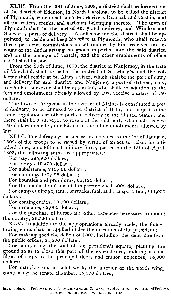 ―122― ―122―
XLIII. From the 30th of June, 1808, a district shall be formed out
of the district of Edenton, in North Carolina, to be called the district
of Plymouth, which shall include the rivers Roanoak and Cashie, and
all the waters, creeks, and harbours belonging thereto. The town of
Plymouth shall be the port of entry and delivery, and Windsor and
Skewarky ports of delivery. A collector for the district shall be ap-
pointed, to reside and keep his office at Plymouth, who shall receive
three per cent. commissions on all monies by him received on ac-
count of the duties arising on goods imported into the said district,
and on the tonnage of vessels, and the other emoluments of office
established by law.
From the 30th of June, 1808, the district of Nanjemoy, in the state
of Maryland, shall be called the district of St. Mary's, and the col-
lector shall reside at St. Mary's river, which shall be the port of entry
and delivery for said district, and Nanjemoy a port of delivery only,
to which a surveyor shall be appointed, who shall, in addition to the
fees and emoluments already allowed by law, receive a salary of 150
dollars.
The town of Augusta, in the district of Maine, is constituted a port
of delivery, to be annexed to the district of Bath, and subject to the
same regulations as other ports of delivery in the United States; and
there shall be a surveyor to reside at the said port, who shall receive
150 dollars annually, in addition to the other emoluments allowed by
law.
XLIV. For defraying the necessary expence to the 1st of January,
1809, of the troops to be raised by virtue of an act to raise, for a li-
mited time, an additional military force, passed on the 12th of April,
1808, the following sums are appropriated:
For pay, 285,920 dollars;
For forage, 18,479 dollars;
For subsistence, 213,696 dollars;
For clothing, 150,528 dollars;
For bounties and premiums, 85,120 dollars;
For the medical and hospital departments, 15,000 dollars;
For camp equipage, tents, barracks, fuel, and transportation, 111,000
dollars;
For contingencies, 10,000 dollars;
For ordnance, 60,000 dollars;
For the purchase of horses and other expences necessary to mount
the cavalry, 36,720 dollars.
XLV. In addition to the appropriations already made, the follow-
ing sums shall be applied under the direction of the president:
For making good the deficit of 1807, including the debt due from
the public offices, 51,500 dollars;
For completing the wall of the president's square, planting the
ground so as to close this part of the expenditure, building a solid
flight of steps to the principal door, and minor expences, 14,000
dollars;
For carrying up, in solid work, the interior of the north wing,
comprising the senate chamber, 25,000 dollars;
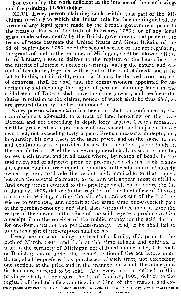 ―123― ―123―
For executing the work deficient in the interior of the south wing,
and for painting, 11,500 dollars.
XLVI. Every person claiming lands within that part of the Mi-
chigan territory to which the Indian title has been extinguished, by
virtue of any legal grant made by the French government prior to
the treaty of Paris, of the 10th of February, 1763; or of any legal
grant made subsequently by the British government, and prior to the
treaty of peace between the United States and Great Britain, of the
3d of September, 1783, or of the second section of the act regulating
the grants of land in the territory of Michigan, shall be allowed till the
1st of January, 1809, to deliver to the register of the land-office for
the district of Detroit, a notice in writing, stating the nature and ex-
tent of his claims, together with a plat of the tract claimed, and if he
fail to do this, all his right, so far as it may be derived from any act
of congress, shall be void, and the commissioners appointed for as-
certaining and deciding the rights of persons claiming lands in the
said district of Detroit shall have the same powers, and perform the
duties in relation to the claims, notices of which shall be thus filed, as
are granted them by the last-mentioned act.
Every person whose claim has been, or shall be confirmed by the
commissioners aforesaid, to a tract of land bordering on the river
Detroit, and not exceeding in depth forty arpens, French measure,
shall be preferred as a purchaser of any vacant land adjacent to his
own tract, not exceeding forty arpens, French measure, in depth, nor,
in quantity, his own tract, at the same price, and on the same terms
and conditions as are provided by law for the other public lands in
the said district. And the surveyor-general shall, as soon as may be,
survey such tracts, and in all cases where, by reason of bends in the
said river, and of adjacent prior or pre-emption claims, each claim-
ant cannot obtain a tract equal in quantity to the adjacent tract already
owned by him, to divide the vacant land, applicable to that object,
between the several claimants, as to him will appear most equitable.
And every person entitled to this privilege shall, on or before the 1st
of January, 1809, deliver to the register of the land-office of Detroit
a notice in writing, stating the situation and extent of the land he
wishes to purchase, and deposit at the same time one-twentieth part
of the purchase-money; and shall also, within three months after the
return of the survey to the office of the said register, produce to him
a receipt from the receiver of the public money for the said district
for one-fourth part of the purchase-money. And, if he shall fail so
to do, his right of pre-emption shall cease.
Every person who, being the head of a family, did, prior to the
26th of March, 1804, and doth at this time inhabit and cultivate a
tract in the territory of Michigan not claimed under a legal French
or British grant, or under the second section of the act before men-
tioned, shall be preferred as purchaser of such tract, not exceeding
one section, at the price and in the manner on which the other pub-
lic lands are directed to be sold. And every person entitled to this
privilege shall, on or before the 1st of January, 1809, deliver to the
register of the land-office a notice, in writing, of the situation and ex-
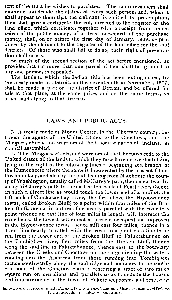 ―124― ―124―
tent of the tract he wishes to purchase. The commissioners shall
examine and decide the claims of every such person, and, when it
shall appear to them that the claimant is entitled to pre-emption,
they shall give a certificate thereof, directed to the register of the
land office, which certificate, together with a receipt from the re-
ceiver of the public money, of at least one-fourth of the purchase
money, shall, on or before the first day of January, 1809, be pro-
duced by the claimant to the register of the land office for the said
district. Of those who shall fail to do so, their right of pre-emp-
tion shall cease.
So much of the second section of the act before mentioned, as
provides that not more than one parcel of land shall be granted to
any one person, is repealed.
The lands to which the Indian title has been extinguished, by
the treaty made at Detroit, on the seventeenth of November, 1807,
shall be made a part of the district of Detroit, and be offered for
sale at that place, at the same price, and on the same terms, as
other lands lying in that district.
LAWS AND PUBLIC ACTS.
I. A treaty made at Mount Dexter, in the Choctaw country, be-
tween the agents of the United States to the Choctaws, and the
Mingoes, chiefs, and warriors of the Choctaw nation of Indians, in
council assembled.
1. The Mingoes, chiefs, and warriors of the Choctaws cede to the
United States all the lands to which they now have or ever had claim,
lying to the right of the following lines: beginning at a branch of
the Humecheeto where the same is intersected by the present Choc-
taw boundary, and also by the path leading from Natchez to the coun-
ty of Washington, usually called M'Clarey's path, thence eastwardly
along M'Clarey's path to the east or left bank of Pearl river, thence
on such a direct line as would touch the lower end of a bluff on the
left bank of Chickasawhay river, the first above the Hiyoowannee
towns, called Broken Bluff, to a point within four miles of the Bro-
ken Bluff, thence in a direct line nearly parallel with the river to a
point whence an east line of four miles in length will intersect the
river below the lowest settlement at present occupied and improved
in the Hiyoowannee town, thence still east four miles, thence in a
direct line nearly parallel with the river to a point on a line to be
run from the lower end of the Broken Bluff to Faluktabunnee on
the Tombigbee river, four miles from the Broken Bluff, thence
along the said line to Faluktabunnee, thence east to the boundary
between the Creeks and Choctaws on the ridge dividing the waters
running into the Alabama from those running into Tombigbee,
thence southwardly along the said ridge and boundary to the south-
ern point of the Choctaw claim: reserving a tract of two miles
square run on meridians and parallels so as to include the houses
and improvements in the town of Fuketcheepoonta, and reserving
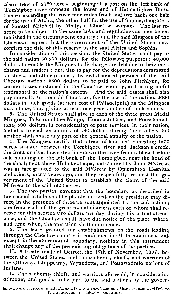 ―125― ―125―
also a tract of 5120 acres, beginning at a post on the left bank of
Tombigbee river opposite the lower end of Hatchatigbee Bluff,
thence ascending the river four miles front and two back, one half
for the use of Alzira, the other half for the use of Sophia, daughters
of Samuel Mitchell by Molly, a Choctaw woman. The last re-
serve to be subject to the same laws and regulations as may be es-
tablished in the circumjacent country; and the said Mingoes of the
Choctaws request that the government of the United States may
confirm the title of this reserve in the said Alzira and Sophia.
In consideration of this cession, the United States shall pay to
the said nation 50,500 dollars, for the following purposes: 48,000
dollars to enable the Mingoes to discharge the debt due to their mer-
chants and traders; and also to pay for the depredations committed
on stock, and other property by evil-disposed persons of the said
Choctaw nation; 2500 dollars to be paid to John Pitchlynn, for
certain losses sustained in the Choctaw country, and as a grateful
testimonial of the nation's esteem. And the said States shall also
pay annually to the said Choctaws, for the use of the nation, 3000
dollars in such goods (at neat cost of Philadelphia) as the Mingoes
may chuse, they giving at least one year's notice of such choice.
3. The United States shall give to each of the three great Medal
Mingoes, Pukshunubbee-Mingo, Hoomastubbee, and Poosshamat-
taha, 500 dollars, in consideration of past services in their nation,
and also to each an annuity of 150 dollars during their office, but
neither shall share any part of the general annuity of the nation.
4. The Mingoes certify that a tract of land not exceeding 1500
acres, situated between the Tombigbee river and Jackson's creek,
the front or river line extending down the river from a blazed white
oak standing on the left bank of the Tombigbee, near the head of
the shoal, next above Hobukentoopa, and claimed by John M'Grew,
was in fact granted to the said M'Grew by Opiomingo Hesnitta
and others, many years ago, and they respectfully request the go-
vernment of the United States to establish the claim of the said
M'Grew to the said 1500 acres.
5. The two parties covenant that the boundary as described in
the second article shall be plainly marked, as the president may di-
rect, in the presence of three persons appointed by the said nation;
one from each of the great medal districts, each of whom shall re-
ceive for this service two dollars per day during his actual attend-
ance, and the Choctaws shall have due notice of the place where,
and time when, the operation shall commence.
6. The lease granted for establishments on the roads leading
through the Choctaw country is confirmed in all its conditions, and,
except in the alteration of boundary, nothing in this instrument
shall change any of the pre-existing obligations of the parties.
II. A treaty made at Detroit, the 17th of November, 1807, be-
tween the United States, and the sachems, chiefs, and warriors of
the Ottaway, Chippeway, Wyandotte, and Pottawatimie nations of
Indians.
1. The sachems, chiefs, and warriors aforesaid, in consideration
of money and goods, to be paid to the said nations, by the govern-
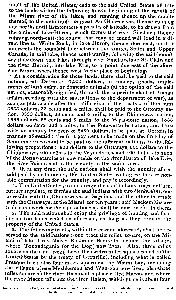 ―126― ―126―
ment of the United States, cede to the said United States all title
to the lands within the following lines: beginning at the mouth of
the Miami river of the lakes, and running thence up the middle
thereof, to the mouth of the great Au Glaize river, thence running
due north, until it intersects a parallel of latitude, to be drawn from
the outlet of lake Huron, which forms the river Sinclair; thence
running north-east the course that may be found will lead in a di-
rect line to White Rock, in lake Huron, thence due east, until it
intersects the boundary line between the United States and Upper
Canada, in said lake, thence southwardly, following the said bound-
ary line, down said lake, through river Sinclair, lake St. Clair, and
the river Detroit, into lake Erie, to a point due east of the afore-
said Miami river, thence west to the place of beginning.
As a consideration for these lands, there shall be paid to the said
nations, at Detroit, 10,000 dollars, in money, goods, imple-
ments of husbandry, or domestic animals (at the option of the said
nations, seasonably signified, through the superintendant of Indian
affairs, residing with the said nations, to the department of war), as
soon as practicable after the ratification of the treaty; of this sum
3333 dollars, 33 cents and 4 mills, shall be paid to the Ottoway na-
tion, 3333 dollars, 33 cents and 4 mills, to the Chippeway nation,
1666 dollars, 66 cents and 6 mills, to the Wyandotte nation, 1666
dollars 66 cents and 6 mills, to the Potawatamie nation, and like-
wise an annuity for ever, of 2400 dollars, to be paid at Detroit, in
manner aforesaid: the first payment to be made on the first day of
September next, and to be paid to the different nations, in the fol-
lowing proportions: 800 dollars to the Ottaways, 800 dollars to the
Chippeways, 400 dollars to the Wyandottes, and 400 dollars to such
of the Pottawatamies as now reside on the river Huron of lake Erie,
the river Raisin, and in the vicinity of the said rivers.
3. If, at any time, the said nations shall wish the annuity afore-
said paid by instalments, the United States will agree to a reason-
able commutation for the annuity, and pay it accordingly.
4. The United States, to encourage the said Indians in agriculture,
further stipulate, to furnish the said Indians with two blacksmiths, one
to reside with the Chippeways, at Saguina, and the other to reside
with the Ottaways, at the Miami, for ten years; said blacksmiths are
to do such work for the said nations as shall be most useful to them.
5. The said nations shall enjoy the privilege of hunting and fish-
ing on the lands ceded as aforesaid, as long as they remain the
property of the United States.
6. The following tracts, within the cession aforesaid, shall be re-
served to the said nations: one tract six miles square, on the Mi-
ami of lake Erie, above Roche deœuf, to include the village,
where Tongadaganie (or the Dog) now lives. Also, three miles
square on the said river (above the twelve miles square ceded to the
United States by the treaty of Grenville), including what is called
Presque Isle; also four miles square on the Miami bay, including
the villages where Meshkemau and Wan-gau now live; also three
miles square on the river Raisin, at a place called Macon, and where
the river Macon falls into the river Raisin, which place is about four-
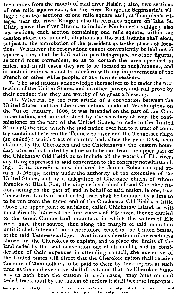 ―127― ―127―
teen miles from the mouth of said river Raisin; also, two sections
of one mile square each, on the river Rouge, at Seginsavin's vil-
lage; also two sections of one mile square each, at Tonquish's vil-
lage, near the river Rouge; also three miles square on lake St.
Clair, above the river Huron, to include Machonee's village; also
six sections, each section containing one mile square, within the
cession aforesaid, in such situations as the said Indians shall elect,
subject to the approbation of the president as to the places of loca-
tion. Whenever the reservations cannot conveniently be laid out in
squares, they shall be laid out in parallelograms, or other figures,
as found most convenient, so as to contain the area specified in
miles, and in all cases they are to be located in such manner, and
in such situations, as not to interfere with any improvements of the
French or other white people, or any former cessions.
7. The said nations acknowledge themselves to be under the pro-
tection of the United States, and no other power, and will prove by
their conduct that they are worthy of so great a blessing.
III. Whereas, by the first article of a convention between the
United States and the Cherokee nation, made at Washington, on
the 7th of Janurary, 1806, it was intended on the part of the Che-
rokee nation, and so understood by the secretary of war, the com-
missioner on the part of the United States, to cede to the United
States all the title which the said nation ever had to a tract of coun-
try contained between the Tennessee river and the Tennessee ridge
(so called): which tract of country had, since the year 1794, been
claimed by the Cherokees and the Chickasaws: the eastern boun-
dary whereof is limited by a line so to be run from the upper part of
the Chickasaw Old Fields as to include all the waters of Elk river,
any thing expressed in said convention to the contrary notwithstand-
ing. It is, therefore, now declared by James Robertson and re-
turn J. Meigs, acting under the authority of the executive of the
United States, and by a delegation of Cherokee chiefs, of whom
Eunolee or Black Fox, the king or head chief of said Cherokee na-
tion, acting on the part of, and in behalf of said nation, is one, that
the eastern limits of said ceded tract shall be bounded by a line so
to be run from the upper end of the Chickasaw Old Fields, a little
above the upper point of an island, called Chickasaw Island, as will
most directly intersect the first waters of Elk river, thence carried
to the Great Cumberland mountain, in which the waters of Elk
river have their source, then along the margin of said mountain
until it shall intersect lands heretofore ceded to the United States,
at the said Tennessee ridge. And in consideration of the readiness
shown by the Cherokees to explain, and to place the limits of the
land ceded by the said convention out of all doubt; and in consi-
deration of their expences in attending council, the executive of
the United States will direct that the Cherokee nation shall receive
the sum of 2000 dollars, to be paid to them by their agent, at such
time as the said executive shall direct, and that the Cherokee hunt-
ers, as hath been the custom in such cases, may hunt on said
ceded tract, until by the fulness of settlers it shall become improper.
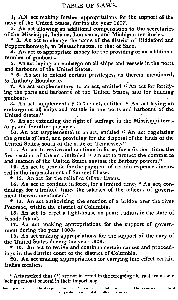 ―128― ―128―
TABLE OF LAWS.
1. AN act making further appropriations for the support of the
navy of the United States, during the year 1807.
2. An act allowing an additional compensation to the secretaries
of the Missisippi, Indiana, Louisiana, and Michigan territories.
∗ 3. An act to change the name of the district of Biddeford and
Pepperelborough, in Massachusetts, to that of Saco.
4. An act to appropriate money for the providing of an additional
number of gunboats.
5. An act laying an embargo on all ships and vessels in the ports
and harbours of the United States.
∗ 6. An act to extend certain privileges, as therein mentioned,
to Anthony Boucherie.
7. An act supplementary to an act, entitled “An act for fortify-
ing the ports and harbours of the United States, and for building
gunboats.
8. An act supplementary to the act, entitled “An act laying an
embargo on all ships and vessels in the ports and harbours of the
United States.”
9. An act extending the right of suffrage in the Mississippi terri-
tory, and for other purposes.
10. An act supplemental to an act, entitled “An act regulating
the grants of land, and providing for the disposal of the lands of the
United States, south of the state of Tennessee.”
11. An act to revive and continue in force, for a further time, the
first section of the act, intituled “An act to protect the commerce
and seamen of the United States against the Barbary powers.”
12. An act to provide for the payment of certain expences incur-
red in the impeachment of Samuel Chase.
∗ 13. An act for the relief of Oliver Evans.
14. An act to continue in force, for a limited time, “An act, con-
tinuing, for a limited time, the salaries of the officers of govern-
ment therein mentioned.”
∗ 15. An act authorizing the erection of a bridge over the river
Potomac, within the district of Columbia.
16. An act to erect a light-house on point Judith, in the state of
Rhode Island.
17. An act making appropriations for the support of govern-
ment during the year 1808.
18. An act making appropriations for the support of the navy of
the United States during the year 1808.
* 19. An act to revive and continue certain causes and proceed-
ings in the district court of the district of Columbia.
20. An act making appropriations for carrying into effect certain
Indian treaties.
* Acts marked thus (*) are not inserted in the foregoing abstract from their
being personal or local in their importance.
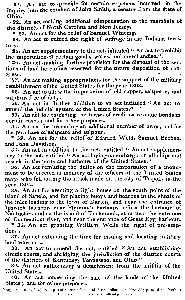 ―129― ―129―
21. An act to provide for certain expences incurred in the
inquiry into the conduct of John Smith, a senator from the state of
Ohio.
22. An act making additional compensation to the marshals of
the districts of North Carolina and New Jersey.
∗ 23. An act for the relief of Samuel Whiting.
24. An act to extend the right of suffrage in the Indiana terri-
tory.
25. An act supplementary to the act, intituled “An act to prohibit
the importation of certain goods, wares, and merchandise.”
26. An act making further provision for the disposal of the sec-
tions of land heretofore reserved for the future disposition of con-
gress.
27. An act making appropriations for the support of the military
establishment of the United States for the year 1808.
28. An act to allow the importation of old copper, saltpetre, and
sulphur, free of duty.
29. An act in further addition to an act intituled “An act to
amend the judical system of the United States.”
30. An act for extending the terms of credit on revenue bonds in
certain cases; and for other purposes.
31. An act for procuring an additional number of arms, and for
the purchase of saltpetre and sulphur.
∗ 32. An act for the relief of Edward Weld, Samuel Beebee,
and John Davidson.
33. An act in addition to the act, entitled “An act supplemen-
tary to the act, entitled “An act laying an embargo on all ships and
vessels in the ports and harbours of the United States.”
34. An act remitting the duties on the importation of a monu-
ment to be erected in memory of the officers of the United States
navy, who fell during the attack made on the city of Tripoli, in the
year 1804.
35. An act for erecting a light house on the south point of the
island of Sapelo, and for placing buoys and beacons in the shoals of
the inlet leading to the town of Darien, and near the entrance of
Ipswich harbour, near Plymouth harbour, before the harbour of
Nantucket, and on the island of Tuckanuck, at or near the entrance
of Connecticut river, and near the entrance of Great Egg harbour.
∗ 36. An act granting William Wells the right of pre-emp-
tion.
37. An act extending the time for issuing and locating military
land warrants.
38. An act to amend the act, entitled “An act establishing
circuit courts, and abridging the jurisdiction of the district courts
of the districts of Kentucky, Tennessee, and Ohio.”
39. An act authorizing a detachment from the militia of the
United States.
40. An act concerning the sale of the lands of the United
States; and for other purposes.
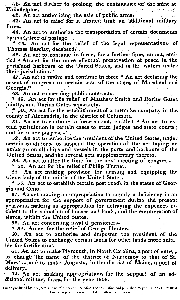 ―130― ―130―
41. An act farther to prolong the continuance of the mint at
Philadelphia.
42. An act authorizing the sale of public arms.
43. An act to raise for a limited time an additional military
force.
44. An act to authorize the transportation of certain documents
by mail, free of postage.
∗ 45. An act for the relief of the legal representatives of
Thomas Barclay, deceased.
46. An act to continue in force, for a further time, an act, enti-
tled “An act for the more effectual preservation of peace in the
ports and harbours of the United States, and in the waters under
their jurisdiction.”
47. An act to revive and continue in force “An act declaring the
assent of congress to certain acts of the states of Maryland and
Georgia.”
48. An act concerning public contracts.
∗ 49. An act for the relief of Matthew Smith and Darius Gates
jointly, and Darius Gates separately.
∗ 50. An act for the establishment of a turnpike company in the
county of Alexandria, in the district of Columbia.
51. An act to continue in force an act, entitled “An act to ex-
tend jurisdiction in certain cases to state judges and state courts;
and for other purposes.”
52. An act to authorize the president of the United States, under
certain conditions, to suspend the operation of the act laying an
embargo on all ships and vessels in the ports and harbours of the
United States, and the several acts supplementary thereto.
53. An act to alter the time for the next meeting of congress.
∗ 54. An act for the relief of Philip Turner.
55. An act making provision for arming and equipping the
whole body of the militia of the United States.
∗ 56. An act to establish certain post roads in the states of Geor-
gia and Ohio.
57. An act making an appropriation to supply a deficiency in an
appropriation for the support of government during the present
year, and making an appropriation for defraying the expences in-
cident to the valuation of houses and lands, and the enumeration of
slaves, within the United States.
58. An act concerning invalid pensioners.
∗ 59. An act for the relief of George Hunter.
60. An act to authorise and empower the president of the
United States to exchange certain lands for other lands more suita-
ble for fortification.
61. An act to make Plymouth, in North Carolina, a port of entry;
to change the name of the district of Nanjemoy to that of St.
Mary's; and to make Augusta, in the district of Maine, a port of
delivery.
62. An act making appropriations for the support of an ad-
ditional military force, for the year 1808.
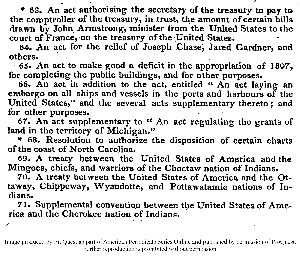 ―131― ―131―
* 63. An act authorising the secretary of the treasury to pay to
the comptroller of the treasury, in trust, the amount of certain bills
drawn by John Armstrong, minister from the United States to the
court of France, on the treasury of the United States.
64. An act for the relief of Joseph Chase, Jared Gardner, and
others.
65. An act to make good a deficit in the appropriation of 1807,
for completing the public buildings, and for other purposes.
66. An act in addition to the act, entitled “An act laying an
embargo on all ships and vessels in the ports and harbours of the
United States,” and the several acts supplementary thereto; and
for other purposes.
67. An act supplementary to “An act regulating the grants of
land in the territory of Michigan.”
∗ 68. Resolution to authorize the disposition of certain charts
of the coast of North Carolina.
69. A treaty between the United States of America and the
Mingoes, chiefs, and warriors of the Choctaw nation of Indians.
70. A treaty between the United States of America and the Ot-
taway, Chippeway, Wyandotte, and Pottawatamie nations of In-
dians.
71. Supplemental convention between the United States of Ame-
rica and the Cherokee nation of Indians.
|
 ―97―
―97― ―97―
―97―